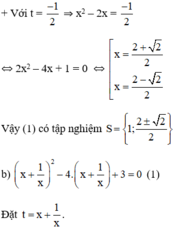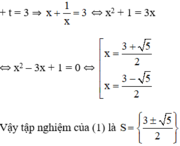
Hãy nhập câu hỏi của bạn vào đây, nếu là tài khoản VIP, bạn sẽ được ưu tiên trả lời.



a ) 5 x 2 + 2 x = 4 − x ⇔ 5 x 2 + 2 x + x − 4 = 0 ⇔ 5 x 2 + 3 x − 4 = 0
Phương trình bậc hai trên có a = 5; b = 3; c = -4.
b)
3 5 x 2 + 2 x − 7 = 3 x + 1 2 ⇔ 3 5 x 2 + 2 x − 3 x − 7 − 1 2 = 0 ⇔ 3 5 x 2 − x − 15 2 = 0
c)
2 x 2 + x − 3 = x ⋅ 3 + 1 ⇔ 2 x 2 + x − x ⋅ 3 − 3 − 1 = 0 ⇔ 2 x 2 + x ⋅ ( 1 − 3 ) − ( 3 + 1 ) = 0
Phương trình bậc hai trên có a = 2; b = 1 - √3; c = - (√3 + 1).
d)
2 x 2 + m 2 = 2 ( m − 1 ) ⋅ x ⇔ 2 x 2 − 2 ( m − 1 ) ⋅ x + m 2 = 0
Phương trình bậc hai trên có a = 2; b = -2(m – 1); c = m 2
Kiến thức áp dụng
Phương trình bậc hai một ẩn là phương trình có dạng: ax2 + bx + c = 0
trong đó x được gọi là ẩn; a, b, c là các hệ số và a ≠ 0.

a) 2 x 2 − 2 x 2 + 3 x 2 − 2 x + 1 = 0 ( 1 )
Đặt x 2 – 2 x = t ,
(1) trở thành : 2 t 2 + 3 t + 1 = 0 ( 2 ) .
Giải (2) :
Có a = 2 ; b = 3 ; c = 1
⇒ a – b + c = 0
⇒ (2) có nghiệm t 1 = - 1 ; t 2 = - c / a = - 1 / 2 .
+ Với t = -1 ⇒ x 2 − 2 x = − 1 ⇔ x 2 − 2 x + 1 = 0 ⇔ ( x − 1 ) 2 = 0 ⇔ x = 1

(1) trở thành: t 2 – 4 t + 3 = 0 ( 2 )
Giải (2):
Có a = 1; b = -4; c = 3
⇒ a + b + c = 0
⇒ (2) có nghiệm t 1 = 1 ; t 2 = c / a = 3 .
+ t = 1 ⇒ x + 1/x = 1 ⇔ x 2 + 1 = x ⇔ x 2 – x + 1 = 0
Có a = 1; b = -1; c = 1 ⇒ Δ = ( - 1 ) 2 – 4 . 1 . 1 = - 3 < 0
Phương trình vô nghiệm.


\(\Delta'=1-4\left(2m-4\right)>0\Rightarrow m< \dfrac{17}{8}\)
Theo hệ thức Viet: \(\left\{{}\begin{matrix}x_1+x_2=-1\\x_1x_2=2m-4\end{matrix}\right.\)
Từ \(x_1+x_2=-1\Rightarrow x_2=-1-x_1\)
Thế vào \(x_1^2=2x_2+5\)
\(\Rightarrow x_1^2=2\left(-1-x_1\right)+5\)
\(\Leftrightarrow x_1^2+2x_1-3=0\)
\(\Rightarrow\left[{}\begin{matrix}x_1=1\Rightarrow x_2=-2\\x_1=-3\Rightarrow x_2=2\end{matrix}\right.\)
Thế vào \(x_1x_2=2m-4\)
\(\Rightarrow\left[{}\begin{matrix}2m-4=-2\\2m-4=-6\end{matrix}\right.\) \(\Rightarrow\left[{}\begin{matrix}m=1\\m=-1\end{matrix}\right.\) (thỏa mãn)

\(x\left(3x-4\right)=2x^2+1\)
\(\Leftrightarrow3x^2-4x-2x^2-1=0\)
\(\Leftrightarrow x^2-4x-1=0\)
Theo Vi - ét, ta có :
\(\left\{{}\begin{matrix}x_1+x_2=-\dfrac{b}{a}=4\\x_1x_2=\dfrac{c}{a}=-1\end{matrix}\right.\)
Ta có :
\(A=x_1^2+x_2^2+3x_1x_2\)
\(=\left(x_1+x_2\right)^2-2x_1x_2+3x_1x_2\)
\(=\left(x_1+x_2\right)^2+x_1x_2\)
\(=4^2-1\)
\(=16-1\)
\(=15\)

\(a,PT\Leftrightarrow x^2-3x+2+x^2-x\sqrt{3x-2}=0\left(x\ge\dfrac{2}{3}\right)\\ \Leftrightarrow\left(x^2-3x+2\right)+\dfrac{x\left(x^2-3x+2\right)}{x+\sqrt{3x-2}}=0\\ \Leftrightarrow\left(x^2-3x+2\right)\left(1+\dfrac{x}{x+\sqrt{3x-2}}\right)=0\\ \Leftrightarrow\left(x-1\right)\left(x-2\right)\left(1+\dfrac{x}{x+\sqrt{3x-2}}\right)=0\)
Vì \(x\ge\dfrac{2}{3}>0\Leftrightarrow1+\dfrac{x}{x+\sqrt{3x-2}}>0\)
Do đó \(x\in\left\{1;2\right\}\)
\(b,ĐK:0\le x\le4\\ PT\Leftrightarrow x+2\sqrt{x}+1=6\sqrt{x}-3-\sqrt{4-x}\\ \Leftrightarrow x-4\sqrt{x}+4=-\sqrt{4-x}\\ \Leftrightarrow\left(\sqrt{x}-2\right)^2=-\sqrt{4-x}\)
Vì \(VT\ge0\ge VP\Leftrightarrow VT=VP=0\Leftrightarrow\left\{{}\begin{matrix}\sqrt{x}-2=0\\\sqrt{4-x}=0\end{matrix}\right.\Leftrightarrow x=4\left(tm\right)\)
Vậy PT có nghiệm \(x=4\)


a: \(\Leftrightarrow\left(2m-2\right)^2-4\left(m^2-2\right)>=0\)
\(\Leftrightarrow4m^2-8m+4-4m^2+8>=0\)
=>-8m>=-12
hay m<=3/2
b: \(\Leftrightarrow\left(4m-4\right)^2-4\cdot\left(-2\right)\cdot\left(4m-6\right)>0\)
\(\Leftrightarrow16m^2-32m+16+32m-48>0\)
\(\Leftrightarrow16m^2>32\)
hay \(\left[{}\begin{matrix}m>\sqrt{2}\\m< -\sqrt{2}\end{matrix}\right.\)
\(a,\Delta'=\left[-\left(m-1\right)\right]^2-1\left(m^2-2\right)\\ =m^2-2m+1-m^2+2\\ =-2m+3\)
Để pt có nghiệm thì \(\Delta'\ge0\) hay
\(\Leftrightarrow-2m+3\ge0\\ \Leftrightarrow m\le\dfrac{3}{2}\)
\(b,\Delta'=\left[-2\left(m-1\right)\right]^2-\left(-2\right)\left(4m-6\right)\\ =4\left(m^2-2m+1\right)+2\left(4m-6\right)\\ =4m^2-8m+4+8m-12\\ =4m^2-8\)
Để pt có 2 nghiệm phân biệt thì \(\Delta'>0\) hay
\(4m^2-8>0\\ \Leftrightarrow\left[{}\begin{matrix}x< -\sqrt{2}\\x>\sqrt{2}\end{matrix}\right.\)
A: 2 x 8 =16
B: 2 x 4 x 4 = 32